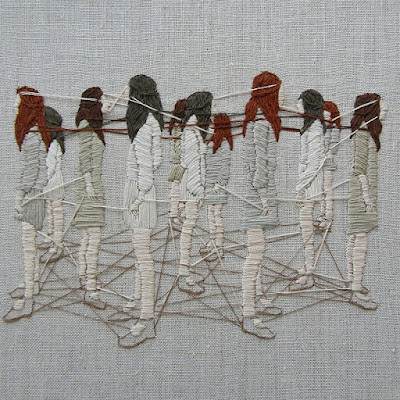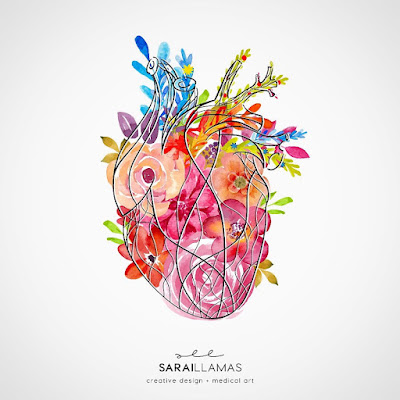(Dibujo de Nerea Casado)
Nos hemos acostumbrado a que nuestros aparatos electrónicos tengan sistema operativo. Una narrativa digital en forma de código que permite que funcionen. Sin ella ni el móvil, ni el ordenador ni el coche se pondrán en marcha, serían solo chatarra. De alguna forma también lo son cuando dicha programación queda obsoleta y deja de ser capaz de manejar aplicaciones o programas diseñados para versiones más actualizadas. En ese momento no témenos más remedio que cambiar a un nuevo aparato con el último sistema operativo disponible. Obsolescencia programada lo llaman.
Obsolescencia sanitaria
A muchas de nuestras instituciones, empresas y organizaciones humanas les está pasando esto. Elijan la que quieran, por mi parte me centraré en la que más conozco que es la sanitaria. Una estructura humana, tecnológica y estructural enorme con un gran presupuesto y una ingente capacidad de servicio y sostén social. Sin embargo llega un momento en que el diseño y la programación original quedan obsoletos lo que empieza a sobrecargar y sobrecalentar delicados circuitos, disminuir la capacidad funcional, dar fallos repetidos del sistema, quedarse colgada cada dos por tres y aumentar el malestar en los usuarios. Cuando es un teléfono el queda obsoleto lo cambiamos pero ¿qué hacemos cuando es la sanidad la que se ha vuelto zombi?
¿Inyectar recursos o hackear el sistema?
Los responsables y directivos se muestran incapaces de hacer frente a esta situación que no es solucionable únicamente inyectando recursos. No es un problema de gestión, es un problema de programación, de sistema operativo. Todo el capital humano, monetario, tecnológico que apliquen a un sistema con su programación obsoleta no funcionará, como no lo hace poner aplicaciones nuevas en un móvil antiguo que no las soporta. El vino nuevo en odres viejos nunca maridó bien como saben los que tengan familia en el pueblo o hayan leído el evangelio.
Las propuestas de nueva programación son infinitas, cada colectivo profesional tiene las suyas, pero me temo que la cosa no va así. El programador suele ser alguien alejado del usuario (interno y externo) aunque tenga obligación de conocerlos. Por eso solo apuntaré algunas pinceladas para hackear el sistema en espera de que dispongamos de una nueva versión, que puede que tarde pero es inevitable que termine llegando.
¿Podrá el sistema cuidar mejor a los sanitarios?
A nivel de gestión priorizaría la atención a los circuitos integrados de mayor calidad del sistema: los profesionales. Y lo haría cambiando el foco desde las métricas de cartera de servicios y programación asistencial, que probablemente se puedan automatizar sin mucho esfuerzo, hacia el cuidado, asesoría y sostén de los profesionales desarrollando para ellos nuevos servicios que mejoren su desempeño profesional y los protejan de la sobrecarga. Mejorar la gestión de “recursos humanos” y tratar de minimizar el maltrato profesional es fundamental si no queremos quedarnos con profesionales que en buena lógica cambian a puestos de trabajo mejores.
¿Se apostará algún día por la autogestión?
A nivel de los centros de salud permitiría más autogestión de una vez por todas confiando en que muchas decisiones operativas son más eficaces si se toman desde el nivel que tiene que bregar con las mayores dificultades. Potenciaría el trabajo en equipo real que evite que unos profesionales tengan el doble de agenda que otros y que algo tan evidente como que un paciente sin cita con un motivo de consulta no complicado pueda ser atendido tanto por enfermeras como por médicos sea por fin una realidad. Aunque parezca mentira en la mayoría de los centros de salud esto sigue siendo imposible. Añadiría para compensar mecanismos de refuerzo de centros sobrecargados fomentando una nueva distribución de recursos proporcional al grado de complejidad que el mismo afronte así como otros de solidaridad que permitan que unos centros más descargados puedan apoyar a los que tengan más necesidad.
¿Conseguiremos dar máximo valor a la logitudinalidad?
Dentro de la consulta la programación debería priorizar ante todo la relación entre profesionales y pacientes que es el centro de todo el Sistema Sanitario. Para facilitarla se debería potenciar la longitudinalidad que se define como el tiempo que un profesional mantiene un destino y una población a su cargo. Esto permite que profesionales y pacientes se conozcan, mejora la información familiar y comunitaria por parte del profesional y la confianza y seguridad por parte del paciente. Solo será posible si se incentiva con vehemencia, no hacerlo hace que los profesionales busquen el cambio para mejorar turno, cercanía al domicilio o disminuir la complejidad del centro de salud.
¿Asitencia sanitaria tipo “fast food” o “low food”?
Lo siguiente a priorizar serían los módulos de comunicación clínica y reflexión, algo que precisa de tiempo y silencio. Una consulta con una agenda desproporcionada o con mucho ruido de fondo (llamadas, distracciones, pacientes sin cita, urgencias, avisos, compañeros que preguntan, puertas que se abren…) lo impiden por definición. Si el módulo de comunicación clínica falla y no hay suficiente escucha será imposible orientar correctamente la anamnesis. Sin una buena anamnesis y el suficiente silencio reflexivo no será posible que el módulo de reflexión oriente bien el caso. La asistencia tipo “fast food” produce gran cantidad de actos al día, pero de poca calidad. Es mucho más rentable priorizar el “low food” sabiendo que será más eficiente, protegerá al profesional y obtendrá mejores resultados en salud para el paciente y la organización.
Esto puede ser costoso para profesionales que han sido entrenados para desarrollar técnicas diversas, cirugía menor, infiltraciones, ecografía, crioterapia… que ocupan un tiempo que no siempre está disponible en una agenda que exceda lo recomendable. No es sencillo asumir una reducción en la cartera de servicios ni en el despliegue de habilidades profesionales, pero es necesario aplicar la máxima inteligencia y flexibilidad a la hora de evaluar la practica asistencial de cada cual. Sin un diagnóstico preciso del tipo de práctica, el tipo de centro de salud y el tipo de agenda seguiremos trabajando en modo piloto automático y seguirá creciendo la frustración y el queme profesional según pasa el tiempo. Para esto quizá una auditoría por pares sea una herramienta útil, con apoyo de las unidades de gestión cuando su ayuda sea requerida.
El despotismo ilustrado en la gestión sanitaria (todo para el paciente pero sin el paciente, todo para el profesional pero sin el profesional) tiene los días contados siendo urgente redefinir los roles y las reglas del juego. Si no lo hace la propia organización lo hará el mercado, de hecho ya lo está haciendo compensando la pérdida de calidad del sistema público con un aumento vertiginoso de servicios y seguros de salud privados.
La reprogramación más difícil
Reprogramar el modo en que los ciudadanos interactúan con el sistema probablemente sea la parte más difícil, no porque sea compleja sino porque no es políticamente rentable y ningún partido apostará por medidas que le resten votos salvo que se consigan consensos que en el caso sanitario no son sencillos de obtener. Si no se logra que se haga un uso más prudente y correcto del sistema será imposible que este sobreviva. Los Sistemas Sanitarios tipo “barra libre” como el nuestro no tienen capacidad para asumir todo el malestar de una sociedad, ni tampoco los pequeños problemas de salud inherentes a la vida ordinaria susceptibles de ser manejados con autocuidados. Toda la energía que se decida a esto se retira de los pacientes más enfermos o potencialmente graves, de los más mayores o los más frágiles. Facilitar que la sociedad lo entienda y asuma su responsabilidad a la hora de usar bien la Sanidad es el primer paso para su supervivencia. Si no aprobamos esta asignatura pendiente tendremos que conformarnos con una Sanidad zombi que no será del agrado ni de gestores, ni de profesionales, ni de usuarios.

Retrato anónimo, tumba egipcia, imperio romano tardío.
Reprogramming primary health centres.
Mainly all our electronic devices have operating systems. A digital narrative in the form of code that allows them to function. Without it, neither the mobile phone, nor the computer, nor the car will run, they would just be junk. In a way, they are also junk when that programming becomes obsolete and is no longer capable of handling applications or programmes designed for more up-to-date versions. At that point we have no choice but to switch to a new device with the latest operating system available. Planned obsolescence, they call it.
Health obsolescence
This is happening to many of our institutions, businesses and human organisations. Take your pick, for my part I will focus on the one I know best, which is the health sector. It is a huge human, technological and structural structure with a large budget and an enormous capacity for service and social support. However, there comes a time when the original design and programming becomes obsolete, which begins to overload and overheat delicate circuits, reduce functional capacity, cause repeated system failures, hang up every so often and increase user discomfort. When it is a phone that becomes obsolete, we replace it, but what do we do when it is the health system that has become zombie-like?
Do we inject resources or hack the system?
Managers and directors are incapable of dealing with this situation, which cannot be solved by injecting resources alone. It is not a management problem, it is a problem of programming, of the operating system. All the human, monetary and technological capital applied to a system with obsolete programming will not work, any more than putting new applications on an old mobile phone that does not support them. New wine in old wineskins never paired well as those who have family in the village or have read the gospel know.
The proposals for new programming are infinite, each professional collective has its own, but I'm afraid that's not the way it goes. The programmer is usually someone far removed from the user (internal and external) even though he or she is obliged to know them. That's why I'll just point out a few tips for hacking the system while waiting for a new version, which may take a while but will inevitably arrive.
Will the system be able to take better care of healthcare workers?
At the management level, I would prioritise attention to the system's highest quality integrated circuits: the professionals. And I would do so by shifting the focus from service portfolio metrics and care programming, which can probably be automated without much effort, to caring for, advising and supporting professionals by developing new services for them that improve their professional performance and protect them from overload. Improving the management of "human resources" and trying to minimise professional mistreatment is essential if we do not want to be left with professionals who logically move on to better jobs.
Will there ever be a move towards self-management?
At the level of health centres, it would allow more self-management once and for all, trusting that many operational decisions are more effective if they are taken at the level that has to deal with the greatest difficulties. It would promote real teamwork that avoids some professionals having double the agenda of others and that something as obvious as a patient without an appointment with an uncomplicated reason for consultation can finally be attended to by both nurses and doctors becomes a reality. Believe it or not, this is still impossible in most health centres. In order to compensate for this, I would add mechanisms to reinforce overburdened centres by encouraging a new distribution of resources proportional to the degree of complexity they face, as well as other solidarity mechanisms that would allow some centres that are more overburdened to support those that are more in need.
Will we succeed in giving maximum value to logitudinality?
Within the consulting room, programming should prioritise above all the relationship between professionals and patients, which is at the heart of the entire healthcare system. To facilitate this, longitudinality should be promoted, which is defined as the time that a professional maintains a destination and a population under his or her care. This allows professionals and patients to get to know each other, improves family and community information on the part of the professional and confidence and security on the part of the patient. It will only be possible if it is vehemently encouraged; if it is not, professionals will seek to change in order to improve their shifts, be closer to home or reduce the complexity of the health centre.
Fast food or low food health care?
The next thing to prioritise would be the clinical communication and reflection modules, something that requires time and silence. A practice with a disproportionate agenda or with a lot of background noise (calls, distractions, patients without appointments, emergencies, announcements, colleagues asking questions, doors opening...) prevents this by definition. If the clinical communication module fails and there is not enough listening, it will be impossible to orientate the anamnesis correctly. Without a good anamnesis and sufficient reflective silence, it will not be possible for the reflection module to orientate the case correctly. Fast food" care produces a large number of acts per day, but of poor quality. It is much more cost-effective to prioritise "low food" in the knowledge that it will be more efficient, protect the practitioner and produce better health outcomes for the patient and the organisation.
This can be costly for professionals who have been trained to develop diverse techniques, minor surgery, infiltrations, ultrasound, cryotherapy... that take up time that is not always available in a schedule that exceeds what is recommended. It is not easy to assume a reduction in the portfolio of services or in the deployment of professional skills, but it is necessary to apply maximum intelligence and flexibility when assessing the care practice of each one. Without an accurate diagnosis of the type of practice, the type of health centre and the type of agenda, we will continue to work in autopilot mode and frustration and professional burnout will continue to grow as time goes by. For this, perhaps a peer audit would be a useful tool, with support from the management units when their help is required.
The days of enlightened despotism in healthcare management (everything for the patient but without the patient, everything for the professional but without the professional) are numbered and it is urgent to redefine the roles and rules of the game. If the organisation itself does not do it, the market will, in fact it is already doing so, compensating for the loss of quality in the public system with a dizzying increase in private health services and insurance.
The most difficult reprogramming
Reprogramming the way in which citizens interact with the system is probably the most difficult part, not because it is complex but because it is not politically profitable and no party will go for measures that will take votes away unless consensus is achieved, which in the case of health is not easy to obtain. If a more prudent and correct use of the system is not achieved, it will be impossible for it to survive. Open bar" health systems such as ours are not capable of dealing with all the discomfort of a society, nor with the small health problems inherent in ordinary life that can be managed by self-care. All the energy that goes into this is withdrawn from the sickest or most potentially serious patients, the oldest or the most frail. Making it easier for society to understand this and to assume its responsibility for the proper use of healthcare is the first step towards its survival. If we do not pass this unfinished business, we will have to make do with a zombie healthcare system that will not be to the liking of managers, professionals or users.













